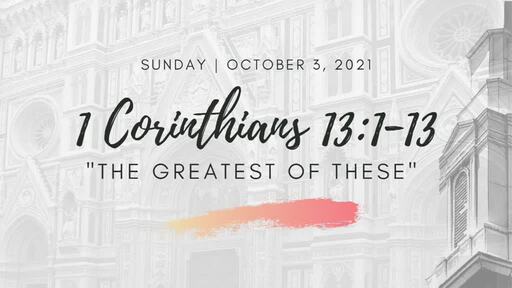1 Corinthians 13:1-13 | "The Greatest of These"

Sunday, October 03, 2021. 1 Corinthians 13:1-13 | "The Greatest of These" We, humans, tend to filter God through only one adjective, like "love." God is love, but He is much more than that. In the same way, if we view God's grace of love from only one angle, we risk distorting what love truly is. Love, as defined by God, is multifaceted. In this famous chapter, the apostle explains to the church what happens when love is absent, when love is active, and when love abides. This message preaches from 1 Corinthians 13:1-13. It is part of a preaching series through 1 Corinthians "To The Church." The title of this sermon is "The Greatest of These."
I. The Reading
II. The Exhortation
It has often been observed that one could substitute the word “Jesus” for “love” throughout verses 4–7. Indeed, as the only sinless person in human history, he provides the perfect model for helping us to understand what patience, kindness, lack of envy, and so on, are. In so doing, we also guard against misinterpreting these attributes. If Jesus was all-loving, but could clear the temple in righteous indignation (Mark 11:15–18) or unleash a torrential invective against the hypocrisy of the conservative religious leaders of his day (Matt. 23), then our concept of love must leave room for similar actions.